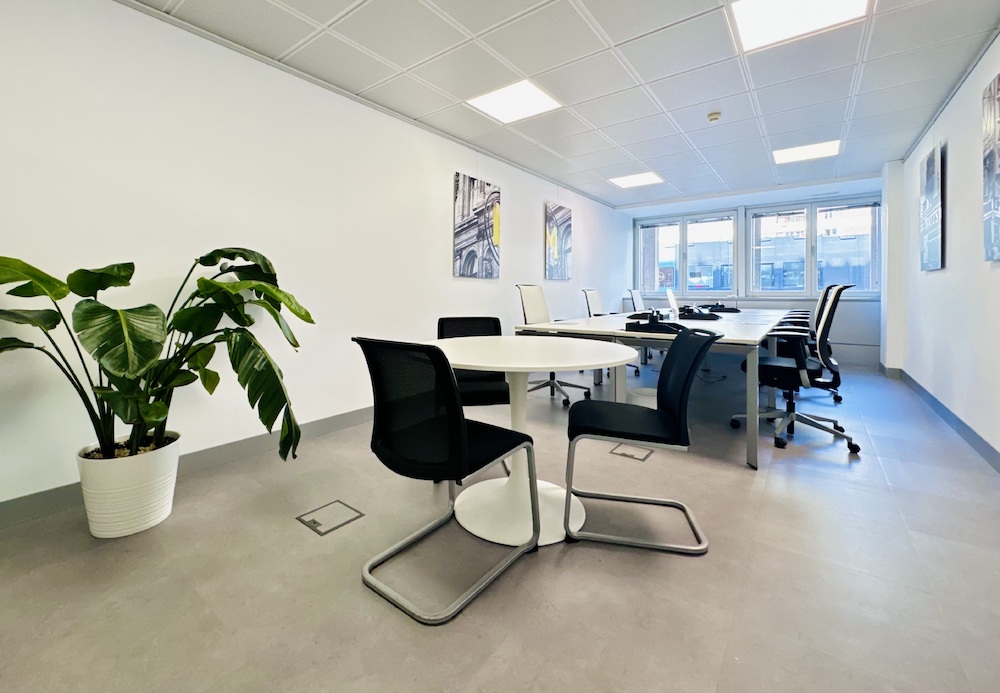From the skyscrapers of the metropolis to the busiest city streets, the business landscape has been dominated by traditional offices, emblems of stability and corporate strength. However, in response to a world in constant evolution, business centres are emerging, spaces that offer flexibility and adaptability, becoming protagonists of the new work paradigm.
In the era of digitalisation and globalisation, where speed and adaptability are key, many entrepreneurs and professionals wonder what is the ideal space to cultivate and expand their operations. Is the support and solemnity of a traditional office the best choice, or the versatility of a business centre the way to go?
Throughout this article, we will unpack the characteristics, advantages and disadvantages of both scenarios, providing a clear vision for those at the crossroads of this decision. The aim is to provide a perspective that allows businesses and entrepreneurs to confidently choose the environment that best supports their aspirations and needs.
So, if you are thinking of moving office space, this comparative article on business centres vs. traditional offices is of interest to you.

Comparison of business centres vs. traditional offices
Throughout this article we will make a detailed comparison of business centres vs. traditional offices. We will indicate the positive and negative points of each of the options, to make it easier to decide.
What is a business centre?
We begin this comparison of business centres vs. traditional offices by talking about the first subject of the analysis.
Business centres are facilities that offer flexible and equipped workspaces for companies, entrepreneurs and professionals. Unlike traditional offices, where a company rents or buys a fixed space for an extended period, business centres offer more adaptable solutions that can be rented by the hour, day, month or year.
One of the main attractions of these centres is the ability to provide everything needed for a business to operate effectively from day one. This includes furniture, high-speed internet connection, meeting rooms, reception services, common areas and, in many cases, access to other professional networks and additional services such as photocopying, courier services or telephone answering.
Business centres are ideal for start-ups, freelancers, independent professionals or large corporations looking to expand into new locations without incurring large initial investments. These spaces promote collaboration and networking, given the diversity of professionals and companies they tend to bring together. In addition, flexibility in terms of contract size and duration allows companies to adapt to market fluctuations and their own growth needs.
With the rise of remote working and digitisation, business centres have gained popularity, becoming an optimal solution for those seeking a balance between a professional environment and the flexibility of not being tied to a traditional long-term rental contract.
Business centre services
In order to make a correct comparison between business centres vs. traditional offices, we must also talk about the different services that can be found in these spaces.
Business centres are not just physical spaces; they are true ecosystems designed to facilitate and optimise the professional activity of those who use them. The following is a breakdown of the most important services they usually offer:
- Office space for rent: These are private spaces, ideal for companies or professionals who require a quiet and reserved environment. They are usually fully furnished and equipped with the latest technology, which allows immediate operation.
- Coworking spaces: These are shared areas where different professionals work in a collaborative environment. These spaces are especially popular among freelancers, entrepreneurs and startups looking for a dynamic environment and networking opportunities.
- Virtual Office: This is a solution for those who do not need a permanent physical space, but wish to benefit from a prestigious business address, reception services and correspondence management. They also usually include a certain number of hours per month in meeting rooms or offices.
- Hourly Offices: Perfect for those who need professional space on an occasional basis. They allow you to rent an office for a few hours, ideal for meetings, interviews or simply to concentrate on a specific project.
- Room Rental: These rooms are designed for meetings, presentations or training. They are equipped with everything you need: projectors, whiteboards, videoconferencing and sometimes catering services. They are ideal for companies that do not have their own space or for those who, being located elsewhere, need a professional venue in a specific location.
These services, combined with the advantages of flexibility, location and professionalism, make business centres an attractive option for a wide variety of professional profiles and companies. In a world where adaptability and efficiency are essential, business centres are positioned as an invaluable tool for business success.
Benefits of business centres
Business centres have transformed the way companies and professionals understand and use workspace. More than just alternatives to traditional offices, these centres offer several unique benefits that enhance the operations, productivity and growth of their users.
In this comparison of business centres vs. traditional offices we will break down the most significant benefits:
- Flexibility: One of the clearest advantages is adaptability in contractual terms. Whether you need a space for a few hours, months or years, business centres offer tailor-made contracts, allowing you to adapt to the changing needs of your company.
- Immediate Operationality: When you walk into a business centre, everything is ready to start working: furniture, internet, technological equipment and more. This eliminates the time and effort that would normally be spent setting up an office from scratch.
- Reduced Costs: By including utilities such as electricity, water, internet, reception and maintenance in a single fee, administration is simplified and unexpected expenses are avoided, which can translate into significant savings.
- Strategic Locations: Many business centres are located in prime city locations, which gives your business address prestige and makes it easily accessible for clients and employees.
- Networking Opportunities: Sharing space with other professionals and companies encourages networking, collaboration and the possibility of finding potential clients or partners.
- Technology and Additional Services: Most of these centres are equipped with the latest technology, conference rooms, breakout areas and sometimes additional services such as catering or administrative assistance.
- Professional Image: Prestigious management, well-equipped meeting rooms and reception services enhance your company’s image with clients and partners.
- Adaptability to Modern Trends: In a world where telecommuting and flexible working are increasingly valued, business centres offer the perfect balance between remote and face-to-face working.
In short, business centres represent a contemporary solution to the challenges facing businesses and professionals today. They provide not just a physical space, but an optimised environment for growth, collaboration and success.
What is a traditional office?
We begin the second point of the comparison of business centres vs. traditional offices. We will analyse the entire ecosystem of traditional offices, which are gradually losing steam nowadays.
A traditional office refers to the physical space usually used by companies and professionals to carry out their daily activities. These offices are the classic model of work environment and have specific characteristics that distinguish them from other more contemporary formats, such as business centres or coworking spaces. Here are some aspects that define traditional offices:
- Fixed Space: A traditional office is an established place, generally rented or acquired by a company, where most, if not all, of its activity is carried out. It does not usually have the flexibility of short-term or hourly contracts.
- Customised Configuration: Unlike shared spaces that offer pre-set furniture and décor, traditional offices allow companies to customise and adapt the space according to their needs and corporate culture.
- Costs and Maintenance: Companies are generally responsible for all associated costs, including rent, utilities, maintenance, insurance and any renovations or upgrades they wish to implement.
- Long-Term Commitments: Traditional office leases are usually long-term, often several years. This can offer stability but can also limit flexibility if the company needs to relocate or adjust its size.
- Privacy: Unlike coworking spaces, traditional offices offer a private environment, which can be essential for certain companies or industries that handle sensitive information.
- Corporate Culture and Atmosphere: As exclusive spaces of a company, traditional offices reflect and reaffirm the corporate culture, values and organisational structure of that entity.
Benefits of moving into a traditional office
We continue in the comparison of business centres vs. traditional offices talking about the advantages of the latter, and despite the growing popularity of alternatives such as business centres or coworking spaces, traditional offices continue to be a relevant option for many companies. These are some of the benefits of opting for a traditional office:
- Stability and Permanence: Traditional offices provide a sense of establishment and durability. Companies can establish their roots and project a solid image to clients and employees.
- Personalisation of Space: Companies have total freedom to design, decorate and configure the space according to their needs and corporate culture, creating an environment that accurately reflects their identity.
- Privacy and Control: Unlike shared spaces, a traditional office offers a completely private environment, ideal for companies that handle confidential information or simply value privacy in their daily operations.
- No External Disturbances: By not sharing the space with other companies or professionals, distractions are minimised and tighter control over the work environment can be maintained.
- Team Consolidation: Having all team members in the same place fosters cohesion, facilitates internal communication and strengthens the corporate culture.
- Predictable Costs: Although initial costs may be higher, once established, the traditional office often has predictable monthly expenses, making financial planning easier.
- Fixed Location for Customers and Suppliers: Companies can establish a recognisable and easily traceable address, which can be crucial for businesses that require frequent visits from customers or suppliers.
- Exclusive space for events and meetings: Immediate availability of meeting rooms or event space without the need for additional bookings is an advantage.
- Internal Growth: A traditional office can offer additional space to expand without having to move, depending on the initial choice and lease agreement.
- Brand Reaffirmation: By having the ability to fully customise the space, companies can reinforce their brand and values in every corner of the office, creating a unique experience for employees and visitors.
As a conclusion to this section of the comparison of business centres vs. traditional offices, traditional offices offer a set of benefits that focus on stability, privacy and personalisation, crucial elements for many companies looking to consolidate their position in the market and strengthen their corporate identity.
Disadvantages and costs of a traditional office
We continue our comparison of business centres vs. traditional offices by discussing the negative points of the latter. Traditional offices, while offering stability and other benefits, also come with certain disadvantages and costs that companies must consider when making a decision. Some of these points are detailed below:
Disadvantages:
- Lack of Flexibility: Once a lease is signed, companies are often committed to staying in that space for an extended period, limiting their ability to adapt to changes in size or location.
- High Upfront Costs: Customisation and furnishing of the space can require significant upfront investment, including furniture, technology and décor.
- Maintenance Responsibility: Unlike business centres where maintenance is usually included, companies in traditional offices must take care of regular maintenance and any repairs that arise.
- Isolation: By not sharing space with other companies or professionals, you may miss out on the networking and collaboration opportunities that coworking spaces offer.
- Administrative management: The management of utilities such as water, electricity, internet and cleaning falls entirely on the company, which can add an additional administrative layer.
Costs:
- Rent: This is the basic and recurring cost for the use of the space.
- Utilities: Electricity, water, heating, air conditioning and internet bills must be managed and paid by the company.
- Maintenance and Repairs: This includes cleaning, minor or major repairs, and any upgrades or renovations to the space.
- Furniture and Equipment: Unless a furnished office is rented, the company should invest in desks, chairs, bookshelves, technology equipment and other essential items.
- Insurance: Companies are usually responsible for taking out insurance to protect the contents of the office and cover potential liabilities.
- Security Deposit: At the beginning of the contract, it is common to ask for a deposit that is returned at the end of the rental, provided there is no damage to the space.
In summary, while traditional offices offer numerous benefits in terms of stability and customisation, it is essential that companies carefully weigh the associated disadvantages and costs to determine whether this option is the most suitable for their needs and long-term goals.
Results of the business centre vs. traditional office comparison
After analysing each of the options individually, it is time to finalise the comparison of business centres vs. traditional offices.
The choice between a business centre and a traditional office depends largely on the specific needs and preferences of each company. Below, we provide a comparative overview of the two to help you visualise the most salient differences and similarities:
Flexibility:
- Business Centre: High. Contracts tend to be more flexible, allowing for short-term and even hourly rentals for some services.
- Traditional Office: Low. Contracts tend to be long-term, limiting adaptability to rapid change.
Initial Cost:
- Business Centre: Low. Spaces are usually fully equipped and ready to use.
- Traditional Office: High. Investment in furniture, decoration and equipment is necessary.
Location:
- Business Centre: They are usually located in prime or central areas, facilitating access and offering a prestigious image. In our case, we have 3 business centres in Madrid, in the best locations of the Spanish capital.
- Traditional Office: Varies according to the company’s choice and budget.
Networking and Collaboration:
- Business Centre: High opportunity due to the coexistence with different companies and professionals in the same place.
- Traditional Office: Limited to the company’s own team.
Personalisation of the Space:
- Business Centre: Limited, as the spaces are pre-designed, however, the decoration within the spaces is 100% customisable.
- Traditional Office: High, allowing to reflect the culture and branding of the company.
Administrative Management:
- Business Centre: Low. Services generally include maintenance, cleaning and other basic services.
- Traditional Office: High. The company is responsible for managing and paying for services individually.
Privacy:
- Business Centre: Varies but may be less in shared spaces such as coworking.
- Traditional Office: High, as it is an exclusive space for the company.
Monthly cost:
- Business Centre: Can be higher due to the inclusion of multiple services and flexibility of contracts.
- Traditional Office: Often more predictable, but companies bear all additional and unexpected costs.
Corporate image:
- Business Centre: Modern and dynamic, associated with innovation and adaptability.
- Traditional Office: Stable and consolidated, conveying solidity and permanence.
Both business centres and traditional offices have their own advantages and disadvantages. The choice will depend on the size of the company, the need for flexibility, the budget, the image you want to project and how you value the opportunity for networking versus privacy. In summary of the comparison of business centres vs. traditional offices, it could be said that it is essential that each company assesses its own needs and circumstances before making a decision.
Conclusion: Business Centre vs. Traditional Office
After analysing the characteristics and advantages, as well as the differences between business centres and traditional offices, it becomes clear that the choice between the two is crucial for the success and development of a company. Both spaces have their merits and suit different business needs and scenarios.
However, in a rapidly changing world where adaptability, modernity and efficiency are increasingly valued, business centres emerge as the prominent option. These spaces not only offer flexible solutions that adapt to today’s fast-paced business environment but also provide invaluable opportunities for collaboration and networking. They also relieve companies of the administrative and maintenance burden of owning their own space.
Business centres represent an innovative response to the contemporary demands of the business world, providing dynamic environments that support growth and expansion. While traditional offices will remain relevant for certain companies seeking stability and a high degree of customisation, there is no denying that business centres offer a value proposition that responds more effectively to the demands and challenges of the 21st century.
Therefore, for companies looking to stay ahead of the curve, adapt with agility to change and maximise their opportunities, opting for a business centre seems to be, without a doubt, the right choice. At least that’s what we think after carrying out this comparison of business centres vs. traditional offices.
We hope that this article where we compare business centres vs traditional offices will be of help to you in your decision-making process. Ibercenter will be happy to answer all your questions about this comparison of business centres vs. traditional offices, as well as to show you even more benefits and offers of our business centres in Madrid.






